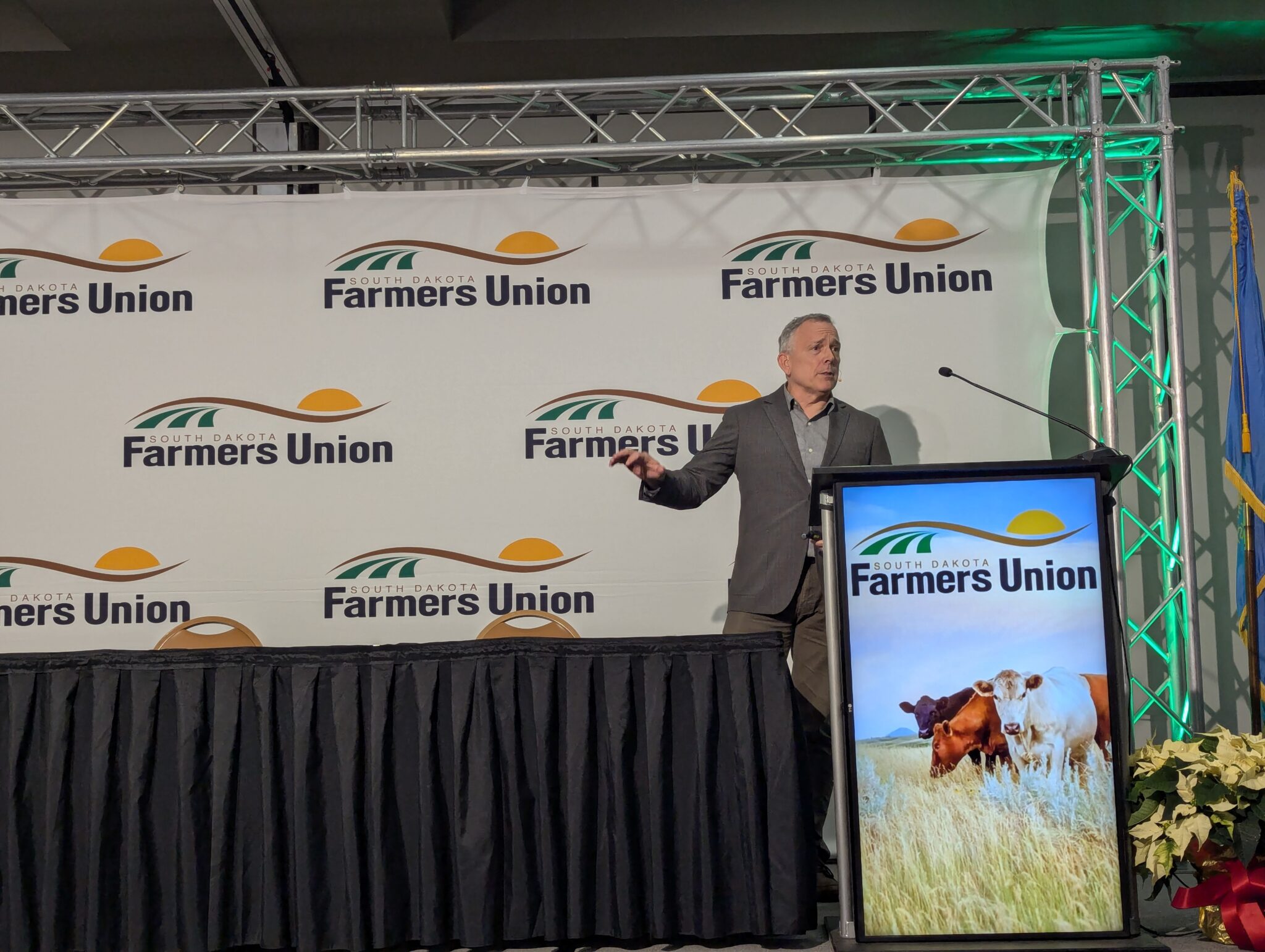
John Hult, South Dakota Searchlight
HURON — The farm community faces uncertainty about tariffs and Cabinet picks but some opportunities to fight beef industry consolidation with the incoming presidential administration, according to the president of the National Farmers Union.
President Rob Larew spoke Thursday at the annual convention of the South Dakota Farmers Union in Huron. President-elect Donald Trump’s promise to levy tariffs on trade partners like China and some of his Cabinet picks have Larew concerned about what farmers might see in the coming years.
Tariffs from the first Trump administration that were continued by the Biden administration hit farmers hard, Larew said. A study from the U.S. Department of Agriculture’s Economic Research Institute said the tariffs resulted in a $27 billion reduction in agricultural exports, with the largest export declines tied to trade with China.
Trump has threatened to issue additional tariffs against China, as well as against Mexico and Canada, upon taking office next month.
“We’re already getting the signals that we’re going to see these tariffs change and imposed on day one,” Larew said.
Matthew Roberts, an agricultural economist from Ohio, spoke to the group earlier in the day about tariffs. They have the potential to hurt farmers’ bottom lines, he said, and are all but certain to affect the price of groceries.
“Sorry, but tariffs are ultimately paid for by consumers in about 80% of the cases,” Roberts said.
Concern about nominees
In their separate speeches, Roberts and Larew both mentioned Trump’s Cabinet picks and the promised efforts of other Trump-aligned insiders, like billionaire Elon Musk, as factors contributing to the unpredictability of farm policy in the coming years.
The work Musk and former presidential candidate and venture capitalist Vivek Ramaswamy plan to do after promising to trim $2 trillion from the federal budget in the name of efficiency might create headaches for farmers, Larew said, though there isn’t a clear picture of what the pair intends to accomplish.
“We don’t really know what’s going to happen there,” Larew said.
Larew also mentioned Trump’s selection of Robert F. Kennedy Jr. as secretary for the Department of Health and Human Services. The one-time independent presidential candidate and scion of the Kennedy political dynasty has long contended that high fructose corn syrup poisons the American diet and contributes to an epidemic of obesity.
Trump said he would allow Kennedy to “go wild” on public health, which has sparked concerns in some quarters about policy shifts such as removing foods and beverages sweetened with the corn byproduct from schools.
Roberts said the selection of RFK Jr. as HHS secretary was the one factor that made Trump less palatable for agriculture and free trade than his opponent.
There have now been three election cycles where the winner of the presidential contest has taken an anti-free trade stance, Roberts said, even as free trade policies have improved the economic lot of millions around the world and opened new markets for farmers.
Roberts said he suspects Kennedy could struggle to gain Senate support. If he gets it, he may struggle to remain in the 47th president’s good graces.
“Kennedy will probably end up opening his mouth, making the president angry, and he’ll get jettisoned before he can do anything terribly permanent,” Roberts said.
Hope on antitrust
But Larew said he has hope in other areas, in spite of the concerns about people like Kennedy or Musk.
He believes that Gail Slater, who has been selected to serve as a top Trump adviser on antitrust issues, takes consolidation seriously.
With antitrust enforcement – a top priority for Farmers Union, which is part of a five-year ongoing legal battle over beef industry consolidation – Larew expects his organization to appeal to Slater on areas affecting agriculture.
He described Brooke Rollins, the incoming president’s choice for agriculture secretary, as a blank slate. Rollins was an adviser to Trump in his first term, and is currently CEO of an organization called the America First Policy Institute.
“I meet at least every couple of weeks with the heads of a lot of other farm and ag organizations,” Larew said. “Even within that big space, nobody knew who she was.”
As far as the farm bill goes, Larew said there is growing fatigue about the topic.
The bill, which includes crop insurance money and a host of other programs for farmers and food assistance for needy families, stalled this year after a series of fits and starts in both chambers of Congress.
At this point, he said, he doesn’t see an immediate end to the logjam.
“I wish I had some hope to offer on that,” Larew said.
